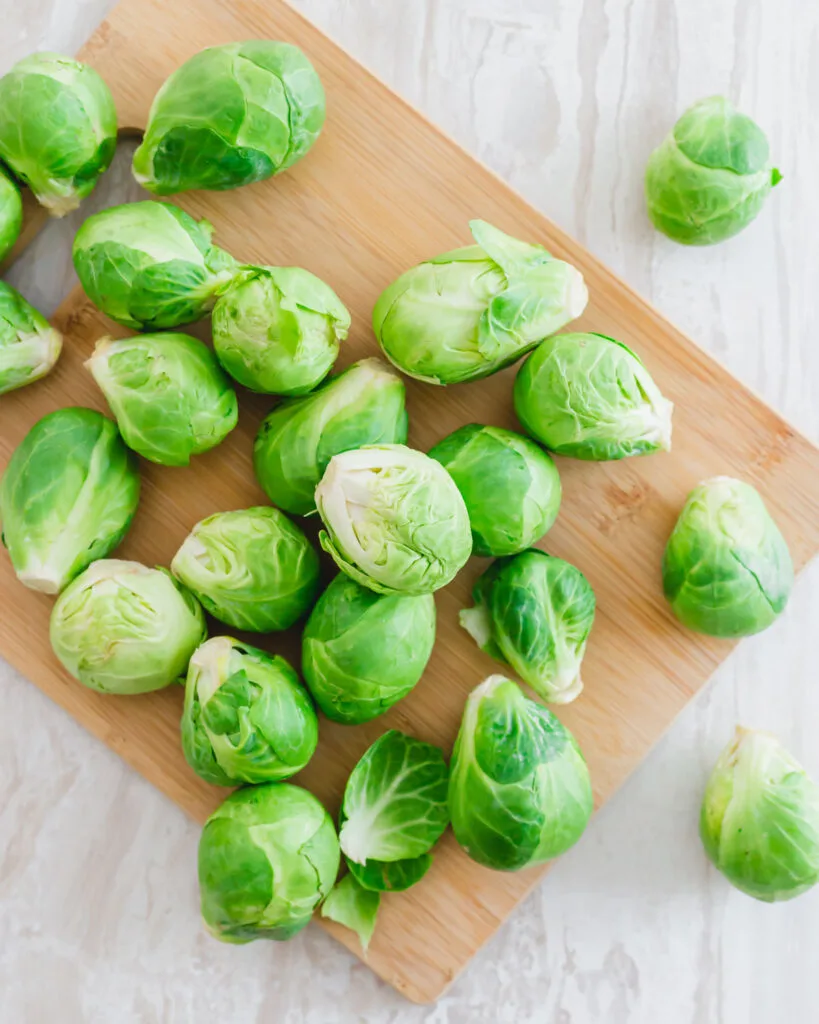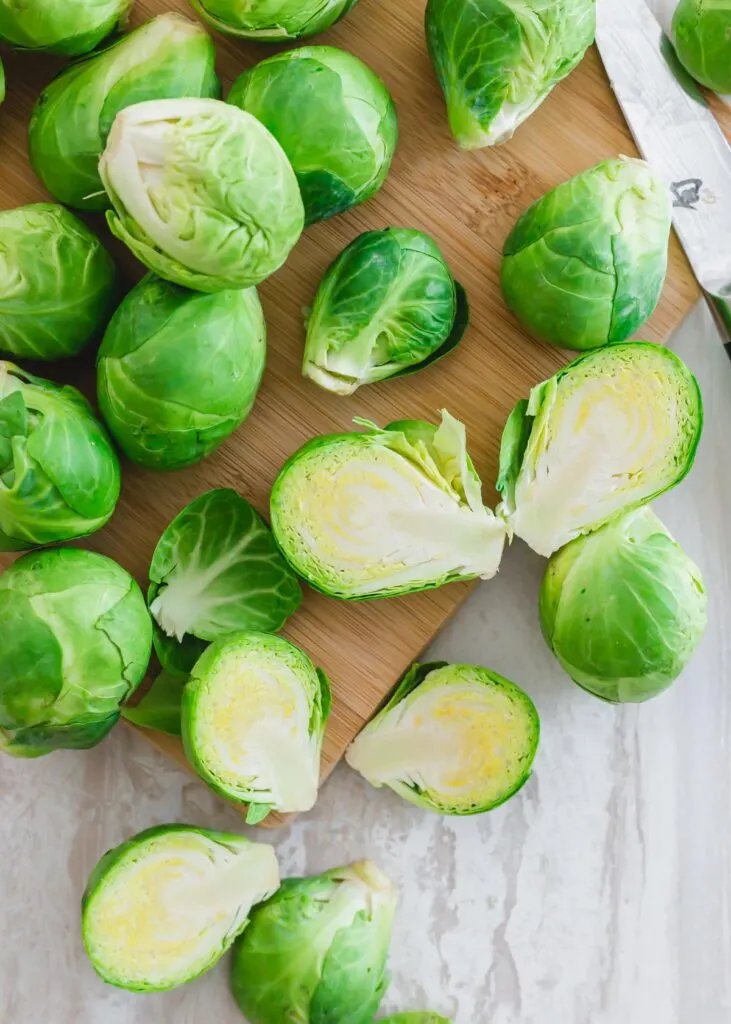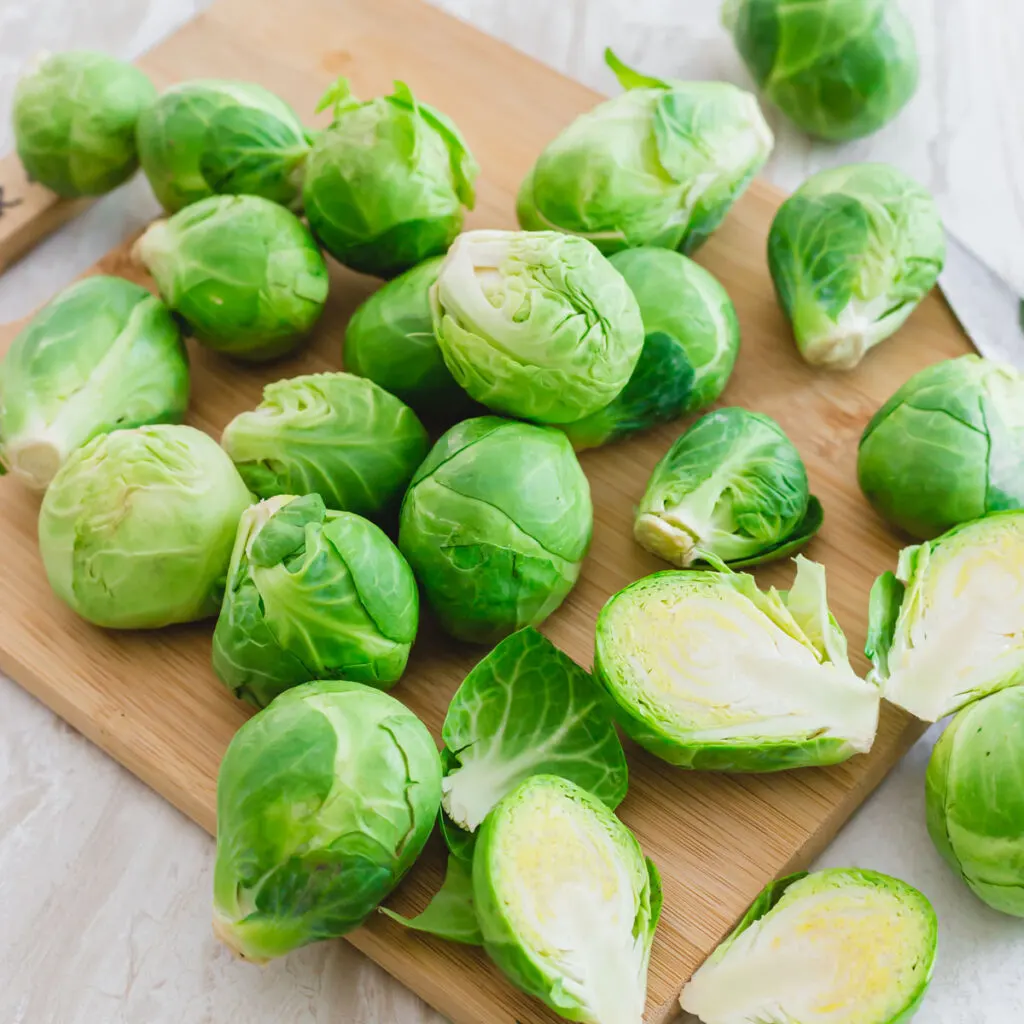Can you feed a dog cooked Brussels sprouts? How about raw Brussels sprouts? Learn everything you need to know about feeding your dog Brussels sprouts.

Brussels sprouts are a pretty divisive food for humans (thanks to mom overcooking these small cabbages into mush in our childhood).
But, if you’re like us and have learned to enjoy eating them in adulthood, you may be wondering – can dogs eat Brussels sprouts too?
The answer is yes, Brussels sprouts are a safe, non-toxic food for dogs and can even be a nutritious addition to their diet with their many essential vitamins.
Our foster dog right now, Molly, devours them straight out of the oven when we roast them for dinner and we’re happy to give her a half or two as a healthy treat.

BENEFITS OF FEEDING YOUR DOG BRUSSELS SPROUTS
Brussels sprouts are part of the cruciferous vegetable family (a category basically synonymous with health for both humans and dogs!) with many nutritional benefits. They’re very rich in dietary fiber and high in antioxidants which fight free radicals.
They’re chock full of vitamin K and also tout high levels of vitamin C. And, they have a respectable amount of vitamin A as well.
Vitamin K helps with bone health, blood clotting and is even protective of the heart.
Vitamin C, as we all probably know, is one of the most ubiquitous antioxidants in plant foods helping to support your dog’s immune system.
You’ll also find vitamin B1 and vitamin B6 in frozen or fresh Brussels sprouts adding to their nutritious profile.
The fiber content is really the star of the show though therefore making Brussels sprouts both nutrient rich and helpful for the gut health of your dog.
Fiber rich vegetables can also be helpful in regulating or lowering blood sugar levels. If you happen to have a diabetic pup, small quantities of Brussels sprouts can be a helpful addition to their diet.
Wondering about other cruciferous vegetables safe for you dog to eat?
Check out – can dogs eat cauliflower? and consider this easy roasted turmeric cauliflower recipe for both you and your pup! Two other vegetables that contain a lot of fiber just like Brussels.
Sauerkraut which is made from cabbage, is also in this family and a great addition to your dog’s diet.

CAN MY DOG EAT RAW BRUSSELS SPROUTS?
Raw Brussels sprouts can be a bit harsh on a dog’s digestive system whether human or canine but it is safe for your dog to eat raw Brussels sprouts.
So if yours is a counter surfer and happens to steal one off the cutting board during meal preparation, don’t be worried. The worst that may happen is a lot of gas and some stomach upset. More on that below.
The Brussels sprouts leafs and Brussel sprout stalks (although they’re even more fibrous) are all safe for your dog to eat.
Related – can dogs eat green beans?
WHAT’S THE BEST WAY TO SERVE BRUSSELS SPROUTS TO DOGS?
Since your dog likely won’t enjoy raw Brussel sprouts, serving them cooked is the best idea for incorporating into their diet.
Preparation ideas include simply steaming, microwaving or roasting. Boiling is ok too but tends to diminish the nutrients in vegetables so we usually avoid that method. Not to mention, it’s the least tasty of the bunch!
Try not to make the mistake of the previous generation and overcook them. When vegetables are overcooked, they tend to loose some of their nutrition and the positive impact they have on a healthy diet is lessened.
Of course, no matter what your cooking process is, never serve your dog Brussels sprouts with onions, leeks, shallots or garlic.
Related – can dogs eat leeks?
Some seasonings can be fine but in general, it’s best to keep human food pretty plain when allowing your dog to eat it as well.
It’s also good practice to keep cooking fats to a minimum when preparing vegetables for your dog. In large amounts, all that extra grease can cause diarrhea or stomach pains for your pup even in the most ironclad of canine stomachs.
A little olive or avocado oil is fine but bacon grease and butter are typically fats that your dog should avoid.
If we plan to give our dogs food we’re also eating, we typically cook a few pieces for them separately in a very plain manner.
So while the humans may indulge in delicious recipes like maple roasted Brussels sprouts on the stalk or even creamy Brussels sprout soup, the pups will get a piece or two plainly roasted or steamed without seasoning as we prepare the meal.
Of course, if your dog suffers from any allergies, it’s best to consult your vet before introducing any new foods.
WHAT’S THE BRUSSELS SPROUT SERVING SIZE FOR DOGS?
It’s best to limit a serving of Brussels sprouts to a moderate amount. One to four pieces depending on the size of your dog and the size of the Brussels sprouts is plenty.
For large sprouts as pictured here, half of one for small dogs and up to two for a large dog would be plenty.
Remember, all human food should be considered a “occasional treat” for your dog. Just because it’s a vegetable doesn’t mean they need to be a big percentage of your pet’s diet.
The preponderance of your dog’s calories should still come from a high-quality, AAFCO certified dog food.

DO DOGS LIKE BRUSSELS SPROUTS?
This will vary from dog to dog.
By nature, canines are carnivores. Some, however, will find the flavor or vegetables appealing while others will sniff them and walk away.
We’ve had both types of dogs as pets and there’s no easy way to know how your dog will react to any human food without trial and error.
Our Belgian Malinois will happily gobble down any and everything including a cooked Brussel sprout whereas our previous Weimaraner would take it in her mouth, drop it on the floor after a few seconds and walk away!
CAN PUPPIES EAT BRUSSELS SPROUTS?
It’s usually not recommended to feed puppies food outside their normal diet. Nutrition needs for growing puppies, just like babies, is much different than an adult dog.
Their digestive systems are also more delicate and susceptible to issues that can be caused by human food. It’s definitely best to hold off introducing Brussels sprouts to your dog until it’s grown out of puppyhood.
CONS OF FEEDING YOUR DOG BRUSSELS SPROUTS
As mentioned above, Brussels sprouts can lead to gas in dogs. This is why it’s best to be frugal on the serving size and not make this vegetable a daily treat.
Sprouts contain high levels of something called isothiocyanate which plays an important role in the dog’s digestive system and its ability to create peristalsis otherwise known as the mechanism that pushes food and waste through the gastrointestinal tract.
This can build up excess bacteria, which results in gas. A moderate amount, it’s essentially a natural way of “cleaning things out” but too much and your dog can end up suffering from diarrhea, loose bowel movements or an upset stomach at minimum.
The good news is, any gas your dog may have after eating Brussels sprouts is totally harmless.
Well, at least to their health, you may feel otherwise!
Another side effect to consider is that for smaller dogs, consuming a whole sprout may pose a choking hazard.
Now that you know dogs can eat Brussels sprouts safely, we hope you enjoy incorporating them into both your diets more frequently! They’re good for you and can be a great addition to your dog’s overall health as well.
